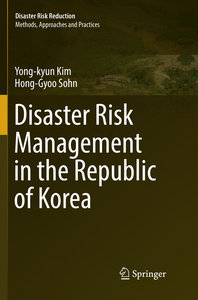KlappentextThis book scrutinizes the entire disaster trajectory history in the Republic of Korea: evolution, cross-over, and interconnection among natural, technological, and social disasters. Also examined is the government´s dynamic reaction for effective disaster responses in the wake of major disasters, labelled as focusing events, distributed in the long tail of the power law function. Collating one nation´s entire disaster history, its disaster management policies, and its responses to major disasters is a unique journey into that nation´s evolution. Korea rose from devastation in the 1950s to become one of the most economically and politically dynamic nations by the turn of the century. However, with rapid growth has come all types of disasters. Looking at the lessons learned from Korea´s disaster risk management measures, policies, and responses, as well as some of the world´s major disasters, we can gain insight into the future of disaster risk management.
This book is intended to lay out developing nations´ potential future disaster risk management path, a theoretical policymaking guide, and desirable institutional and organizational transformations. Effective countermeasures included in this book will guide policymakers, capacity builders, and academics in developing nations to avoid the disaster path in the near future at the cost of rapid economic growth that Korea faced.


